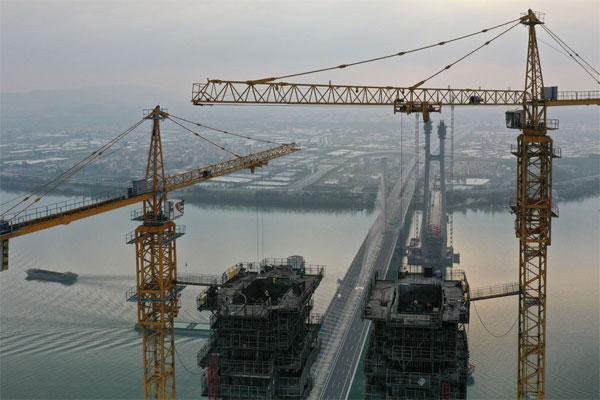
Workers construct a railway bridge in Guangzhou, Guangdong province, which is a key project relating to the Guangdong-Hong Kong-Macao Greater Bay Area development. XINHUA
China has announced new policies and pilot programs to promote the financial opening-up and integration of the Guangdong-Hong Kong-Macao Greater Bay Area, as part of the efforts to help the area play a lead role in the nation's economic development, experts said.
The People's Bank of China, the central bank, and regulators of the banking, insurance, securities and forex sectors jointly issued 26 new measures late on Thursday to guide financial reforms in the area.
Under the measures, pilot schemes would be started for qualified foreign limited partner, qualified domestic limited partner, and qualified domestic investment enterprises, enabling institutional investors in Hong Kong and Macao to participate in private equity and venture capital funds in the Greater Bay Area through the QFLP scheme, said a statement on the PBOC website.
The area, which includes nine Guangdong cities and the Hong Kong and Macao special administrative regions, is one of the regions with highest opening-up level and the most dynamic economy in the nation, said noted economist Song Qinghui.
He said the new policies will further stimulate market vitality and boost high-quality economic development in the region. Moreover, it will also help transform the area into a world-class city cluster and pioneer the nation's economic advancement, he said.
Xing Yujing, president of the Shenzhen Central Subbranch of the PBOC, said the new measures will help the social and economic development of the region as it recovers from the novel coronavirus epidemic.
The guidelines also called for the setting up of funds for key projects in the Greater Bay Area, allowing capital from insurance firms and bank's wealth management units in the Chinese mainland and the two SARs to participate.
Channeling funds from the overseas and domestic markets for infrastructure construction in the Greater Bay Area will be an effective measure to speed up cross-border financial connections, said Yu Lingqu, deputy director of the Department of Finance and Modern Industries at Shenzhen-based think tank the China Development Institute.
He said the area could form a first-class innovative capital funding center with each city bringing its advantages into full play, such as Hong Kong's initial public offering market and Shenzhen's high-tech industries.
In the banking sector, a joint account system combining Chinese and foreign currencies is in the pipeline to promote cross-border trade and investment in the area. Local residents will be able to invest in wealth management products issued by mainland, Hong Kong and Macao lenders.
Song Yuesheng, vice-chairman and chief executive of Hang Seng Bank (China) Ltd, said such an account system will function as "a financial cross-border bridge" and release substantial cross-border financing demand.
"The expected growth in cash flow will help financial institutions to innovate their services and products," he said.
Buoyed by the record surge in cross-border financial exchanges last year, the bank in April launched online capital checking and transfer services for customers with two accounts across the border.
In addition, a Guangdong-Hong Kong-Macao Greater Bay Area international commercial bank will be set up in the Guangdong Pilot Free Trade Zone, regulators said. Commercial banks will be encouraged to set up financial asset investment companies and wealth management companies in the area, without any caps on foreign ownership.